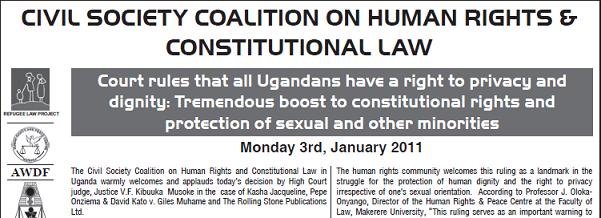UPDATE: A coalition of Ugandan human rights groups just now issued a press release describing the ruling. After the text of the initial post, I have the details and a link to the press release.
I don’t have the details yet but according to Frank Mugisha and commenter Richard Willmer, a Ugandan court issued a ruling today in favor of the plantiffs in the Rolling Stone case.
In early October, 2010, a Ugandan tabloid calling itself the Rolling Stone began a campaign of outing GLBT people in Uganda complete with pictures and personal information. Some people were attacked as a result and sexual minority advocates went to court to stop the campaign. A Ugandan court issued an initial order to stop the outing pending a hearing. Today’s ruling is the result of that hearing. No word yet whether the Rolling Stone will appeal. According to Rolling Stone editor, Giles Muhame, the tabloid will appeal the ruling.
Watch for details…
UPDATE: Here is the press release issued by the coalition of human rights groups with details of the ruling today from a Ugandan court barring the Rolling Stone from outing LBGT people.
The Civil Society Coalition on Human Rights and Constitutional Law in Uganda warmly welcomes and applauds today’s decision by High Court judge, Justice V.F. Kibuuka Musoke in the case of Kasha Jacqueline, Pepe Onziema & David Kato v. Giles Muhame and The Rolling Stone Publications Ltd.
Through its members Kasha Jacqueline, David Kato and Patience Onziema, the Coalition filed a complaint in the High Court against the Rolling Stone. The Court issued an interim order restraining the editors of the newspaper from any further publication of information about anyone alleged to be gay, lesbian, bisexual or transgender until the case could be finally determined.
After an initial postponement, the merits of the case were heard on November, 2010. The final ruling was read today, 3rd January 2011. In considering whether the Rolling Stone’s publication of alleged homosexuals’ names, addresses and preferred social hang-outs constituted a violation of the applicant’s constitutional rights, the Court, ruled that:
1) The motion is not about homosexuality per se, but ‘…it is about fundamental rights and freedoms,’ in particular about whether ‘the publication infringed the rights of the applicants or threatened to do so’.
2) The jurisdiction of Article 50 (1) of the Constitution is dual in nature, in that it extends not just to any person ‘whose fundamental rights or other rights or freedoms have been infringed in the first place,’ but also to ‘persons whose fundamental rights or other rights or freedoms are threatened to be infringed.’
3) Inciting people to hang homosexuals is an attack on the right to dignity of those thus threatened: ‘the call to hang gays in dozens tends to tremendously threaten their right to human dignity.’
4) Homosexuals are as entitled to the right to privacy as any other citizens. Against the ‘objective test’, ‘the exposure of the identities of the persons and homes of the applicants for the purposes of fighting gayism and the activities of gays…threaten the rights of the applicants to privacy of the person and their homes.’
5) Section 145 of the Penal Code Act cannot be used to punish persons who themselves acknowledge being, or who are perceived by others to be homosexual. Court ruled that ‘One has to commit an act prohibited under section 145 in order to be regarded as a criminal.’ Clearly this applies only to a person who has been found guilty by a court of law.
In terms of the relief sought by the applicants, court issued a permanent injunction preventing The Rolling Stone and their managing editor, Mr. Giles Muhame, from ‘any further publications of the identities of the persons and homes of the applicants and homosexuals generally.’ The injunction thus provides broad protection to other Ugandans who are, or who are perceived to be homosexual, and the ruling provides an important precedent should any other media attempt to publish similar information. The court further awarded UGX. 1,500,000/= to each of the applicants, as well as ordering that the applicant shall recover their costs from the respondents.
Read the rest of the press release here.
